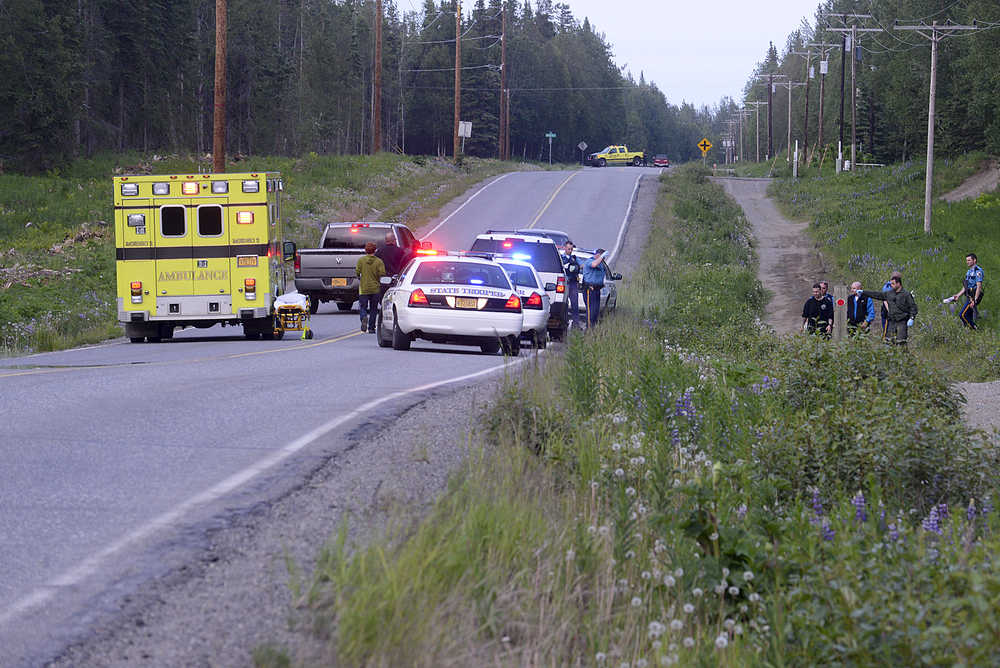More than 10 years after Nikiski voters rejected the formation of a police service area, a similar ordinance is in the works and could be brought back on the October ballot.
A Nikiski community action group tasked with evaluating law enforcement options in response to rising property crime issues, received support from the Nikiski Community Council to work toward a proposition that, if approved, would organize a Nikiski law enforcement service area.
The proposed service area would encompass the same boundaries as the Nikiski Fire Service Area, which covers 6,000 square miles including multiple industrial complexes and extends out to the western shore of the Cook Inlet.
Nikiski resident Ben Carpenter presented the results of the committee’s findings at a Nikiski Community Council meeting Monday at the Nikiski Senior Center. The committee requested a letter of support from the council and $500 that will go toward community meetings to educate people about the proposition.
While the group has met with the Alaska State Troopers and talked about reallocating more troopers to the area, Carpenter said that agency is focused on highway patrol and emergency response. If the community wants to properly address the drug problem that has fueled the rash of thefts, Nikiski needs its own police force, he said.
“In order to conduct law enforcement agencies within a second-class borough, a service area has to be created,” Carpenter said. “This is going to require an increase in our taxes. We know that. We don’t like it but we also realize if we are going to solve our own problems, we are going to have to pay for it.”
To finance a police service area, the proposition would ask Nikiski voters to accept a 1.5 mill increase that would generate $2.2 million dollars. The group settled on that figure after looking at the Seward Police Department, which they saw as a comparable coverage area.
The Seward Police Department has nine police officers and an annual operating budget of $1.8 million. Carpenter said a cheaper option that could be handled under a service area would be to contract protection out to another law enforcement agency.
A 1.5 mill increase would result in an extra $150 per $100,000 assessed value for each taxpayer. The service area would be run by five elected board members, who could submit a recommendation for a chief law enforcement officer to the borough mayor for appointment.
Nikiski resident Sue Tauriainen said she supported the idea of a service area. Her home and neighborhood had been burglarized in the past, she said.
“I know we need police officers here and $150 a year doesn’t seem like a whole lot,” she said.
Nikiski resident Michele Hartline asked if the committee looked into the feasibility of a volunteer community patrol group rather than funding a service area. Carpenter said an expanded neighborhood watch program still wouldn’t increase response time in the event of a crime.
Nikiksi Community Council President Fred Miller said when the council formed in 2000, they sent out a survey and police protection was the third ranked item of neighborhood concern.
“The problem has not gone away,” he said.
As a non-profit, Miller said the council cannot make a resolution to accept a service area because the authority is not within their charter. The council can make a recommendation to the Kenai Peninsula Borough Assembly, he said.
Assembly member Wayne Ogle, who represents Nikiski, said he would introduce an ordinance, similar to what the assembly approved in 2004 to establish a police service area. Ogle said he has until August to introduce the ordinance for it to make the borough election in October.
In 2004, the assembly passed an ordinance to establish a Nikiski police service area by an 8-1 vote. That ballot measure proposed one mill increase to generate $1.3 million to cover the start-up cost. The proposition failed with 65 percent of 1,303 voters against the tax increase.
Ogle said times have changed considerably. With a population now of more than 7,000 people in Nikiski and the growth of commercial and industrial businesses, he said the need for more police protection is acute.
The assembly passed a resolution at the Jan. 20 meeting that requested that Department of Public Safety Commissioner Gary Folger reallocate trooper personnel and put in a trooper post in Nikiski. Ogle said he is hoping to travel to Juneau in the near future and have a discussion with Folger in person about his thoughts on an increased trooper presence in Nikiski.
Trooper E-Detachment Commander Capt. Andy Greenstreet said he continues to meet with borough assemblymen about what resources troopers can provide to the Nikiski area, but the decision to reallocate troopers is made by the commissioner. He said the uncertainty in the department’s budget and how it would affect their efforts is a challenge.
Last fall, Greenstreet formed the property crime suppression unit, a team of troopers Casey Hershberger and Matt Ezell, who concentrated investigations to combat the drug and burglary problems in the unincorporated areas of the central Kenai Peninsula. With the help of community involvement the unit has put together successful cases and made “great progress,” he said.
“I hope to build on those successes and give the support the community needs,” Greenstreet said.
Ogle said if a service area were formed that doesn’t necessarily mean Nikiski would get its own police department. Service area board members could opt to contract out to another law enforcement agency. The city of Kenai would be the closest agency.
“(Kenai was) not enthused about it from a practical standpoint,” Ogle said. “They have enough on their plate.”
Ogle said while troopers have made great progress in Nikiski, the volunteer efforts of community members like Ann Krogseng to rally support to work toward solutions in their community makes a big impact.
“Everybody looks to government to solve problems,” he said. “The work the committee has done to make things better and doing their part is commendable.”
Reach Dan Balmer at daniel.balmer@peninsulaclarion.com.

